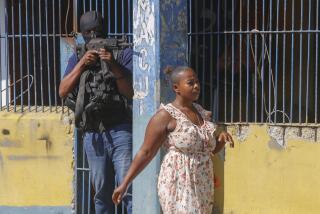Backing Up Principle With Justified Muscle : For OAS, military action in Haiti mustn’t be ruled out
- Share via
The United States has such a long and unhappy history of military intervention in the Caribbean that President Bush was wise to play it cool when asked whether this country might join an international military effort to restore Haiti’s first democratically elected government, ousted Monday in an unwarranted military coup.
But diplomatic nuance aside, the President’s response didn’t mean that some measure of international force to help resolve the Haitian crisis is out of the question. In fact, it would be useful for the Organization of American States to start discussing that very option. If nothing else, it just might convince the Haitian junta that its outrageous, illegal gamble cannot and will not succeed.
When Haitian President Jean-Bertrand Aristide arrived in Washington Wednesday, he promptly asked a special meeting of the OAS to help him restore Haiti’s legitimate government.
Later, Pentagon officials announced that a Marine expeditionary force is being readied in case it becomes necessary to rescue an estimated 8,000 U.S. citizens in Haiti. But Bush said he is “disinclined” to ponder any unilateral action beyond a rescue attempt. He added that he would “wait and see” what action the OAS decides to take.
The OAS could authorize a special diplomatic mission to try to persuade Haiti’s military leaders to return power to Aristide, the first popularly elected president in Haitian history. It could back up that request with the threat of diplomatic and economic sanctions by every nation in the Western Hemisphere--even Cuba, which also condemned the coup.
Diplomatic pressure might work. Haiti is the poorest nation in the Americas and needs all the help it can get. But the OAS must not overlook the possibility that it might have to take some kind of military action--even if only a symbolic show of force--to back up a government elected just last December.
Aristide’s chief opposition is the military, which so fears losing power that it has intervened against every civilian government that has tried to rein it in. The Haitian generals don’t seem to understand that Aristide is different from the rest: He won the people’s mandate. The OAS needs to raise the issue of military action with auspicious urgency. Simply discussing the option would send a signal to the antediluvian generals in Port-au-Prince that the OAS is serious about restoring Aristide. That is surely what OAS members meant to imply last June when they voted, at their annual foreign ministers’ meeting, to take “any measures deemed appropriate” to restore constitutional rule whenever it is overthrown.
It was powerfully symbolic that the OAS’ June meeting was held in Chile, an old and proud democracy that only recently returned to civilian government after a decade of dictatorship under Gen. Augusto Pinochet.
Was the Organization of American States trying to send military men throughout the hemisphere a message that Pinochet was the last of his ilk? If so, it may be time to back up that principle with muscle. But one hopes that’s not necessary.
More to Read
Sign up for Essential California
The most important California stories and recommendations in your inbox every morning.
You may occasionally receive promotional content from the Los Angeles Times.












